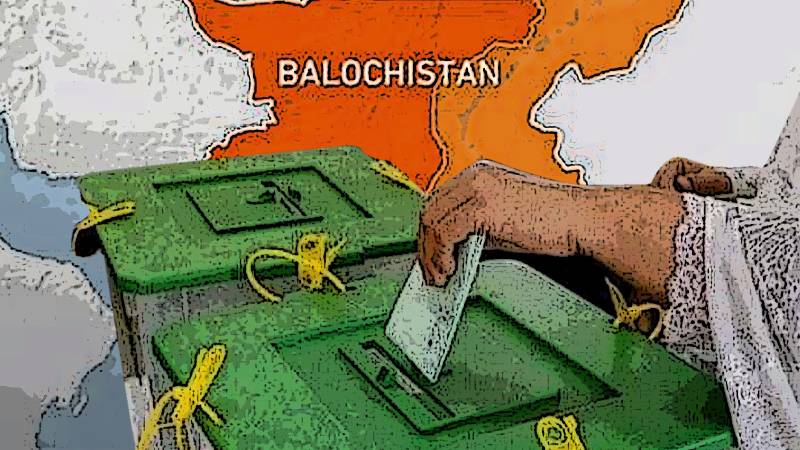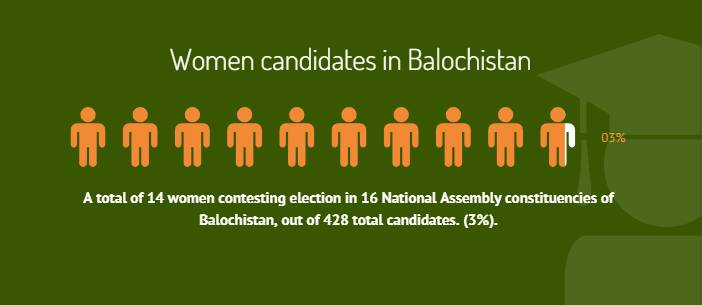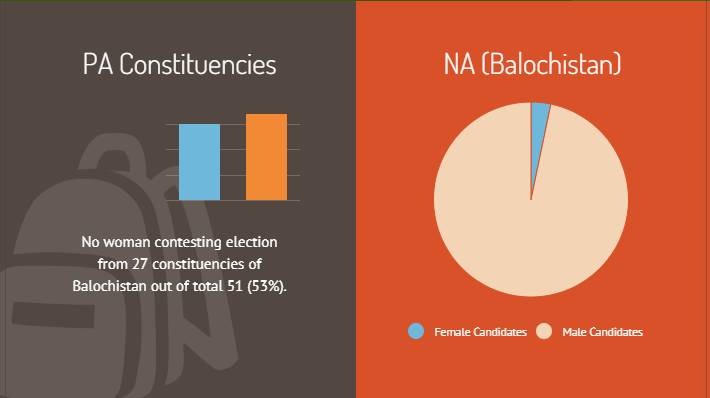
In around half of the provincial and national assembly constituencies of Balochistan, no female candidate will be contesting the upcoming general elections, highlighting a pervasive gender disparity in the region's political landscape.
Women face challenges ranging from strong conservative cultural norms, party priorities, economic capabilities and interest from women.
Balochistan, often cited as a province with high gender discrimination, struggles with limited women's participation in politics. The 2018 elections saw only one successful female candidate out of 37 who contested on general seats.
This situation seems to have worsened in the upcoming general elections. Of the 428 candidates who are contesting for 16 national assembly seats, only 14 candidates - just three percent - are women. They are contesting for 10 seats, where multiple women contesting for a single seat on four occasions.

Some 1,286 candidates are vying for the 51 provincial assembly seats. Of these, only 38 candidates - around three percent - are women. These women, however, are contesting for just 24 seats, or around 47% of all available seats.
Loyalty unrewarded
Sana Durrani is the provincial deputy secretary of the People's Party. The 40-year-old political activist is contesting elections from PB-43 Quetta-VI.
Despite playing an active role in party politics and years of service, Sana was overlooked by her party when handing out tickets for the 2024 general elections. Dismayed by her party's decision, she will contest the upcoming elections as an independent candidate rather than her party's platform.
Speaking about the challenges faced by women in Balochistan's politics, Sana emphasised the need for women to actively participate, both in reserved and general seats.
She contended that the conservative societal values of Balochistan, particularly in the tribal and religious contexts which dominate mainstream discourse in the province, often confine women to domestic roles and discourage their involvement in politics and other public engagements.

Contesting the elections as an independent, Sana has had to contend with another key factor preventing more women from participating in politics: finances.
Acknowledging women's financial hurdles in contesting elections, Sana attributed them to the lack of economic empowerment and property ownership amongst female candidates.
Moreover, she pointed out the complexities of elections in a region with low literacy rates and a strong party-based system.
Apathy of political parties
The case of Sana Durrani being overlooked by her party for an electoral ticket is not unique in Balochistan.
Political parties, however, argue that they adhere to the Election Commission's mandatory guideline to allocate five percent of all party tickets for general seats to women candidates.
The political parties, however, allocate these seats in constituencies where the candidates lack substantial public support or where the party has little to no hope of winning.
Many female candidates who are contesting the elections are doing so in areas that are considered to be historically weak for their respective parties. This raises questions about the commitment of political parties to foster genuine representation of women in politics.
Increasing representation
Political activist Advocate Sumira Aslam has been pushing for increasing the quota of general seats on which parties must nominate women candidates. She suggests amending Article 206 to mandate at least one woman candidate is nominated with a 5% quota, irrespective of the total number of candidates fielded by a party.
Alauddin Khilji, a director at Aurat Foundation, highlights the prevalent practice of nominating women candidates solely to meet the criteria set by the Election Commission, without considering a party's strength in the specific constituencies where such women candidates are nominated.
As Balochistan gears up for the 2024 elections, it is crucial to address deep-rooted cultural norms, provide better educational opportunities, and tackle socio-economic constraints to empower women and enhance their active participation in politics.

